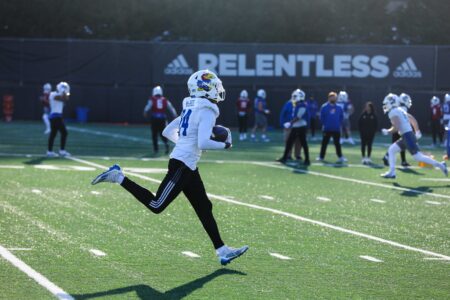Garbage men: KU receivers, corners talk trash — a lot

There’s no way of telling if there was any trash-talking during this play from the April 24 spring game, during which Bradley McDougald (24) lost the handle on a pass under pressure from Phillip Strozier (26), but chances are good there was some yapping going on.
Try as they might, most Kansas University wide receivers and cornerbacks just can’t seem to keep their mouths shut, especially when facing each other on the practice fields.
During routes, their lips move. After completions, their jaws are working. And after drops, their gums flap louder. No matter where you are on the field or whom you stand by, there’s usually no avoiding the verbal battle waged by these two highly visible units.
“Yeah, maybe I need to stop talking so much, because I feel like when I come back to the huddle, I’m just exhausted,” senior receiver Johnathan Wilson said. “I can have a full-fledged argument with those guys the whole practice.”
And, usually, “those guys” are happy to reciprocate.
Trash talking is nothing new for either position. Players on both sides of the ball have made careers out of the art of the verbal attack, and many of the current Jayhawks know that. But most of them don’t yap for notoriety. Most of them do it for inspiration.
“When we see a receiver make a play, we all get rowdy,” sophomore cornerback Greg Brown said. “When we see the cornerbacks make plays, we all get rowdy. When a safety makes a play, we get rowdy. You kind of have to get under their skin just so they’ll go hard. I want them talking to me, too, so I’ll go hard. When we talk trash, that makes us work harder.”
Most days, there’s no limit to the type of talk that is exchanged between these two groups during the heat of the moment.
“The G-rated version? OK, it could be anything,” Wilson said. “It could be me just running them off and not even getting the ball, and they’ll be like, ‘Ah, I locked you up. You ain’t gettin’ the ball!’ So we go arguing back and forth over that. Or I can block them or make a catch on them, and I’m talking the whole time, telling them they can’t hold me and they’re not good and stuff like that. It just goes back and forth. But we get into it at practice a lot. We really do. But then we get to the locker room, and we laugh about it.”
Added senior cornerback Chris Harris: “We love going out there talking mess, man. That’s what we do. I’m pretty much the main one talking mess, but I’m glad (my teammates are) starting to catch on with that. As long as you’re talking mess, man, I like that.”
So who talks the best, or, should we say the most?
“I gotta go with (Daymond Patterson) or John (Wilson),” Harris said. “They’ve done a lot of talking. I go against John all day, and I’m always tellin’ him, ‘Man, John, I’m tired of going against you.’ But we just keep going at it, and we keep talking. That’s the only way we’re gonna get better.”
Brown threw his own name into the mix, too.
“Chris Harris and John Wilson talk the most,” he said. “To each other and in general. But I think I probably rank right behind them.”
Funny that the guys who talk the most on the field also were the most willing to talk about it off the field.
One surprise participant who was willing to talk about the dynamic was cornerbacks coach Vic Shealy, who said some of the trash talk that goes on can be good for the team.
“As long as a guy plays with great intensity when he needs to play, that’s the main thing,” Shealy said. “Some of the stuff we do in practice, where the guys are kind of jawing and stuff like that, some of that is just the guys trying to create a setting where the emotion side meets the intensity part.”
Shealy said he, like many others in the program, found himself caught up in the comedy of the jawing that goes on between Harris, Brown, Wilson and the rest.
“I get tickled out there,” he said. “But sometimes it’s kind of a distraction, and you gotta bring ’em back a little bit.”
The most important thing, in Shealy’s eyes anyway, is that the jawing doesn’t negatively affect a player’s ability to concentrate.
“You gotta back it up with how you play,” he said. “I don’t think you have to coach talking. But the reality of it is, there’s going to be some guys when we step out onto that field against other teams, where if our guys are timid and they can be broken by someone else’s words, then that could hurt us. If it means they kind of learn to deal with that part of the game (in practice), then that’s a good thing. That’s probably not the first and last time that kind of thing is going to happen on the field.”
And no one associated with it expects it to stop.
“They don’t shut up,” Brown said. “It goes on the whole practice. Nobody wants to shut up.”
That includes Brown, who, after one practice this spring, found time to let sophomore wideout Bradley McDougald hear one last dose of trash talk as he left the practice fields. With McDougald staying after practice to catch passes from the gun to work on his hands, Brown walked by and laughed, saying, ‘That’s the only time you’ll be open when I’m on the field.’
“I like talking trash to Bradley because he’s a young guy. I know we’re in the same class, but I like pushing him because I see a lot of talent,” Brown said.







